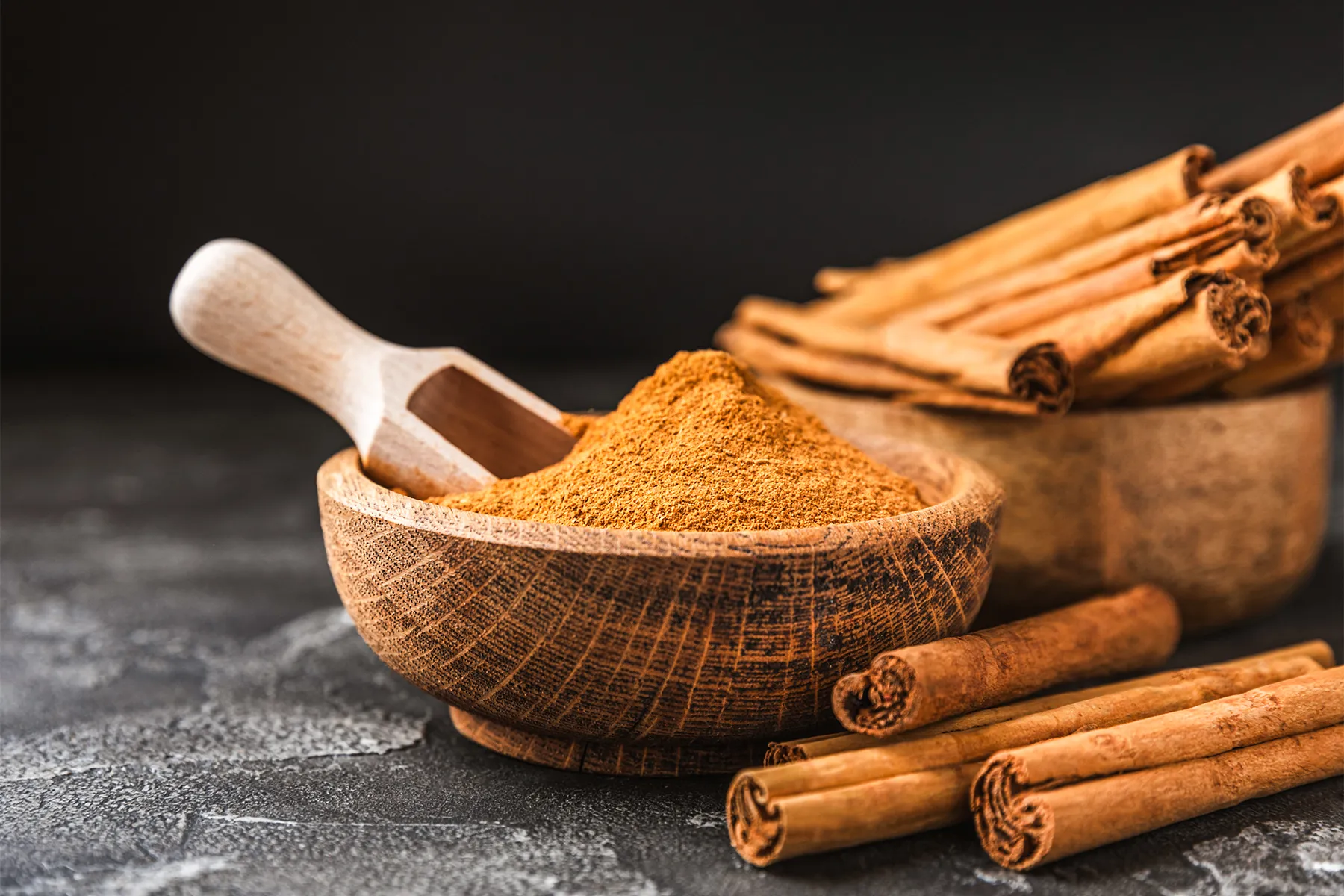Cinnamon is packed with antioxidants and other valuable compounds. Some studies indicate it may assist with blood sugar control, guard against cardiovascular disease, and decrease inflammation.
This spice has been treasured for its therapeutic qualities for millennia.
In recent decades, scientific research has begun to validate many of the health advantages traditionally linked to cinnamon.
Below are 10 health benefits of cinnamon that have scientific support.

1. Possesses potent medicinal qualities
Cinnamon is derived from the inner bark of trees in the genus Cinnamomum.
It has been used as a prized ingredient since ancient times, even in Ancient Egypt. It was once rare, valuable, and offered as a present suitable for royalty.
Today, cinnamon is inexpensive and commonly found in most grocery stores. It’s also used as an ingredient in many dishes and recipes.
There are two primary varieties of cinnamon:
- Ceylon cinnamon: Often called “true” cinnamon.
- Cassia cinnamon: The more widespread variety today, commonly referred to simply as “cinnamon.”
Cinnamon is produced by cutting the stems of cinnamon trees and peeling away the inner bark, removing the woody parts.
When the bark dries, it forms strips that curl into rolls known as cinnamon sticks. These sticks can be ground into cinnamon powder.
The characteristic aroma and taste of cinnamon come from its essential oil, which is rich in the compound cinnamaldehyde (2).
Researchers believe this compound is largely responsible for many of cinnamon’s strong effects on health and metabolism.
SummaryCinnamon is a well-known spice high in cinnamaldehyde, which is thought to drive most of its health-promoting actions.
2. Rich in antioxidants
Antioxidants shield the body from oxidative damage caused by free radicals.
Cinnamon is abundant in powerful antioxidants, including polyphenols.
One trial reported that cinnamon supplementation significantly raised antioxidant concentrations in the blood while decreasing inflammatory markers like C-reactive protein.
Indeed, cinnamon’s antioxidant potency is such that it can even serve as a natural preservative for foods.
SummaryCinnamon contains high levels of potent polyphenol antioxidants.
3. May exhibit anti-inflammatory effects
Inflammation plays a crucial role in defending the body against infections and repairing tissue damage.
However, chronic inflammation that targets the body’s own tissues can be harmful.
Cinnamon may help here: studies indicate the spice and its antioxidants have strong anti-inflammatory properties.
SummaryThe antioxidants in cinnamon demonstrate anti-inflammatory activity, which could help lower disease risk.
4. Could help protect the heart
Cinnamon has been associated with a lower risk of heart disease, the leading cause of death worldwide.
A review found that taking at least 1.5 grams (about 3/4 teaspoon) of cinnamon daily reduced triglycerides, total cholesterol, LDL (bad) cholesterol, and blood glucose in people with metabolic disorders.
Another analysis of 13 studies observed reductions in triglyceride and total cholesterol levels, both recognized heart disease risk factors.
Consuming cinnamon consistently for at least eight weeks has also been shown to lower blood pressure.
Taken together, these changes could contribute to a decreased risk of cardiovascular disease.
SummaryCinnamon may improve several important heart-disease risk markers, including cholesterol, triglycerides, and blood pressure.
5. May boost insulin sensitivity
Insulin is a key hormone that controls metabolism and energy usage.
It’s also necessary for transporting glucose from the bloodstream into cells.
Some individuals exhibit insulin resistance, a condition where insulin’s effects are diminished—this is central to metabolic syndrome and type 2 diabetes.
Although further research is required, some studies suggest cinnamon can reduce insulin resistance.
By improving insulin sensitivity, cinnamon may lower blood sugar and help with glycemic control.
Summary»MORE:Living with diabetes? Explore our top resources.Cinnamon has been shown to meaningfully increase sensitivity to insulin, potentially aiding in blood sugar regulation.
6. Helps reduce blood sugar
Cinnamon is well recognized for its blood-sugar-lowering effects.
Beyond improving insulin sensitivity, cinnamon may reduce blood glucose via several additional mechanisms.
Firstly, it has been shown to decrease the amount of sugar that enters the bloodstream after meals.
It does this by interfering with several digestive enzymes, slowing the breakdown of carbohydrates in the gut.
Secondly, a compound in cinnamon can mimic insulin’s effects, improving cellular glucose uptake.
Numerous human studies have confirmed cinnamon’s benefits, showing reductions in fasting glucose and improvements in hemoglobin A1c, a marker of long-term glycemic control.
Effective doses are usually 1–6 g, roughly 0.5–2 teaspoons of cinnamon per day.
SummaryCinnamon has been shown to lower fasting blood glucose when taken in doses of about 1–6 g (0.5–2 tsp) per day.
7. May benefit neurodegenerative disorders
Neurodegenerative diseases involve progressive deterioration of nerve cell structure or function.
Alzheimer’s and Parkinson’s diseases are two common examples.
Certain cinnamon compounds appear to inhibit the accumulation of tau protein in the brain, a hallmark of Alzheimer’s disease.
In a 2014 mouse study of Parkinson’s disease, cinnamon helped protect neurons, restored neurotransmitter levels, and improved motor performance.
However, these promising findings need confirmation in human studies.
SummaryAnimal studies show cinnamon may deliver various benefits in Alzheimer’s and Parkinson’s models, but human research is still lacking.
8. Might offer anti-cancer benefits
Cinnamon has been examined for its possible role in cancer prevention and treatment.
Most evidence comes from test-tube and animal experiments that suggest cinnamon extracts may guard against cancer.
It appears to inhibit tumor cell growth, reduce tumor blood vessel formation, and can be toxic to cancer cells, inducing cell death.
One mouse study of ovarian cancer found that cinnamaldehyde suppressed expression of proteins involved in cancer progression.
Test-tube work also showed cinnamaldehyde reduced growth and spread of ovarian cancer cells.
Nevertheless, more human research is needed to assess cinnamon’s potential anti-cancer effects.
SummaryAnimal and laboratory studies suggest cinnamon may have cancer-protective effects, but human trials are required.
9. May inhibit bacterial and fungal growth
Cinnamaldehyde, a chief active component of cinnamon, may help combat various infections.
In vitro studies indicate cinnamon oil can kill certain fungi that cause respiratory infections.
It may also suppress growth of bacteria such as Listeria and Salmonella.
Additionally, cinnamon’s antimicrobial actions may help prevent dental decay and reduce halitosis.
However, most evidence comes from lab studies, so further human research is necessary.
SummaryCinnamaldehyde exhibits antifungal and antibacterial activity, which might lower infection risk and improve oral health. More human studies are needed.
10. Could have antiviral effects
Some research suggests cinnamon may offer protection against certain viral infections.
For instance, extracts from Cassia varieties are thought to act against HIV-1, the most common human HIV strain.
Other studies suggest cinnamon could help defend against viruses like influenza and Dengue, which is transmitted by mosquitoes.
Still, more clinical trials in humans are required to confirm these antiviral properties.
SummaryAlthough human data are limited, some laboratory studies indicate cinnamon may help protect against certain viruses.
Which variety is preferable?
Not all cinnamon types are equal.
Cassia cinnamon contains appreciable amounts of coumarin, a compound that can be harmful in high doses.
While both types offer health benefits, Cassia may pose issues in large amounts because of its coumarin content.
Ceylon (“true”) cinnamon is superior in this respect, as it typically contains much lower coumarin levels than Cassia.
Cassia cinnamon is generally cheaper and more widely sold than Ceylon cinnamon.
You can often find Ceylon in specialty health food stores and through online retailers.
summaryCassia cinnamon is more affordable and easier to locate but higher in coumarin, which can be problematic at high intakes. Ceylon cinnamon is a safer alternative and is available at some specialty shops and online.
The takeaway
Cinnamon is a versatile spice linked to many health benefits.
Due to its array of beneficial compounds, it may help reduce blood sugar, lower heart disease risk factors, and dampen inflammation.
For optimal safety, choose Ceylon cinnamon or use small amounts of Cassia cinnamon.
























Leave a Reply
You must be logged in to post a comment.